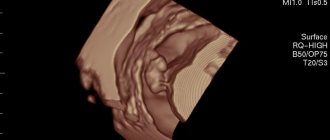Photo: Depositphotos The 16th week of pregnancy is a wonderful and calm time for the expectant mother. The child continues actively , but the woman’s body already adapted to taking place . Her well-being and mood noticeably improving, and growing belly is pleasing. the for all the information you need to know about this period of pregnancy .
What's happening
At the 16th week of pregnancy, the length of the fetus will reach 11 - 11.5 cm, and the weight will be 80 g. All vital processes are actively going on in the body of the little man: the heart is working hard, the kidneys are regularly excreting urine, the development of the central nervous system continues. By 15–16 weeks of pregnancy, the composition of the fetal blood has already taken shape: it, as it should be, consists of lymphocytes, erythrocytes and monocytes. It contains fetal (or “fetal”) hemoglobin: it is needed for a better supply of oxygen to cells, and in a newborn its share is about 80 - 85% of the total amount. However, already at this stage, “adult” hemoglobin appears - within six months after the birth of the child, it will replace the fetal one.
By the 16th week of pregnancy, the baby’s muscles have already become sufficiently strong, he has learned to hold his head straight and turn it from side to side, and move his fingers and toes. Your baby is very active: he smiles, frowns, yawns, swallows, spits, sucks his thumb and even tries to play with what he finds nearby: he grabs the umbilical cord, touches his arms and legs. And if there is more than one baby in the mother’s belly, the children communicate with each other.
Complications
To avoid possible unpleasant consequences during pregnancy with twins, you need to be attentive to sensations, changes in psychological and physical state, visit a gynecologist on time, and listen to his advice.
Possible complications of multiple pregnancy:
- one fertilized egg stops developing (anembryony);
- intrauterine death of one embryo;
- chromosomal abnormalities;
- the connection of organisms when twins transform into Siamese twins;
- disturbance of placental circulation, in which blood is distributed disproportionately between children (feto-fetal transfusion syndrome). This is typical for monochorionic pregnancy, when the embryos have a common bladder and placenta;
- congenital diseases;
- early severe toxicosis, lasting longer than in a singleton pregnancy;
- miscarriage;
- Iron-deficiency anemia;
- severe swelling;
- excessive shortness of breath caused by displacement of the uterus, compression of the stomach, diaphragm, and lungs;
- tooth loss, alopecia;
- gestosis occurs in the third trimester of pregnancy. Characterized by dysfunction of the brain, kidneys, and blood supply system. Main symptoms: high blood pressure, protein in urine.
There is a danger to the health of the mother herself, since she has to withstand double loads.
How you feel
During the 15th – 16th week of pregnancy, the uterus grows and stretches the muscles and ligaments in the lower abdomen, which is why you may feel minor pain. Now the uterus has grown so much that it can already be felt: to do this, empty your bladder, lie on your back and relax. Now try using your fingertips to gently explore the area in the middle of your abdomen, just above your pelvic bone. The protruding area is your unborn child. If nothing works and you cannot feel the uterus, ask your doctor to teach you how to do it correctly.
At the 16th week of pregnancy, due to compression of the intestines, problems with going to the toilet “in a big way” may appear. If we were talking only about discomfort, it would not be so scary, but prolonged constipation can increase the risk of miscarriage. Therefore, it is imperative to review your diet and include foods that have a laxative effect. To prevent problems with peristalsis in the 15th – 16th week of pregnancy, it is advisable to do simple physical exercises every day and walk in the fresh air, and it’s also a good idea to visit the pool.
Your breasts continue to enlarge and your areolas become even larger and darker. The hormonal surge has ended and your appetite has increased. However, you must try not to overeat and constantly monitor your body weight. Normal weekly weight gain ranges from 300 to 500 g.
And at the stage of 15 - 16 weeks of pregnancy, your temperature may increase by 1 - 2 degrees. There is no need to worry: the body “overheats” due to intense work, and with the help of increased sweating and a feeling of heat, the body cools itself. The amount of vaginal discharge may also increase. Increased secretion is a kind of preparation of the genital tract for childbirth.
In general, the 16th week of pregnancy is a period when a woman’s emotional state normalizes and her energy returns. A thirst for vigorous activity appears: you want to start renovations, large-scale shopping, or even moving. But the expectant mother should be careful - not to lift weights and not to overwork, because this can negatively affect the health of her baby.
Lifestyle
If worries and fears about pregnancy still haunt you, now is the best time to take up yoga. It is believed that yoga for pregnant women is a set of the most gentle and safe physical exercises for expectant mothers. Special positions (asanas) help cope with feelings of anxiety and relieve emotional stress. During classes, a woman learns to control her breathing, relaxes, “unloads” the spine and... communicates with other expectant mothers, which is also important.
Risk factors
If pregnancy develops without pathologies and complications, there should not be any particular unpleasant sensations at this stage. With prolonged physical activity, you may experience pain in the lower back or legs, but in no case in the lower abdomen.
At the 16th week of pregnancy, the risk of developing iron deficiency anemia increases. This is due to an increase in the volume of circulating blood and a decrease in the number of red blood cells in it. To compensate for iron deficiency, the gynecologist may prescribe medications containing this element. Also, in the blood of the expectant mother, when the period has reached 16 weeks of pregnancy, a lack of calcium and magnesium is often detected, which is fraught with the appearance of cramps in the legs (most often at night). In this situation, special magnesium preparations will help, and to replenish the daily need for calcium, it is enough to eat a little cottage cheese and drink a glass of kefir or milk every day.
Discharge at 16 weeks of pregnancy is white or yellowish and practically odorless. When they cause itching, have a strong odor and turn green, these may be symptoms of a genital infection that must be treated. And if the discharge turns brown, pink or red, this is a cause for serious concern. In combination with cramping pain, a feeling of tightness in the lower back and a “petrified” abdomen, they can be a sign of uterine hypertonicity. Take a lying position and immediately call an ambulance.
Fetal movement at sixteen weeks
By the 16th week, most expectant mothers have already experienced the sensations associated with the first movement of the fetus. Basically, these are still quite weak, barely perceptible tremors that appear when the baby is especially active. Such tremors intensify if a woman experiences fear or is in a stressful situation. The fetal movement is most noticeable at night, when her body is completely relaxed.
Also, if there is no movement in the sixteenth week of pregnancy, there should be no reason to panic. The fact is that every woman has individual characteristics of her body, and every expectant mother develops her child differently. For some, already at 14-15 weeks it begins to behave more than actively and clearly manifest its presence, for others it does not.
If an ultrasound of the fetus, performed at 13-15 weeks, did not show any abnormalities in its development, there is no need to worry about the lack of motor activity. In this case, most likely the expectant mother simply does not feel his pushes yet. She will definitely experience a similar feeling a little later.
It is necessary to contact a specialist if sensations of fetal movement have already occurred, but have suddenly stopped. A decrease in the child’s motor activity may indicate oxygen starvation, as well as a very dangerous condition - frozen pregnancy at 16 weeks. Such a diagnosis means a sudden cessation of development and death of the fetus. Experts have not yet fully figured out why this happens.
Medical observation
At the 16th week of pregnancy, in addition to a general blood and urine test, you may have to donate blood for a coagulogram (to determine its coagulation), free estriol, AFP and hCG. With diseases such as Down syndrome, cranial hernia and anencephaly, the level of these substances will deviate from the norm.
Usually an ultrasound is not performed at 16 weeks of pregnancy, but if one is prescribed, the expectant mother will be able to observe on the monitor not only the movements of her baby, but also his facial expressions. This time, using a regular ultrasound machine, you can determine the sex of the child, if, of course, your baby turns the right way.
In some cases, amniocentesis is prescribed at the 16th week of pregnancy. For this test, a puncture is made in the amniotic sac and a small amount of amniotic fluid is removed using a needle. A diagnostic test allows you to determine with almost absolute certainty whether the fetus has a particular pathology. This study can identify several hundred genetic defects. But this procedure is unsafe: according to statistics, infection occurs in one case out of a thousand, and the risk of miscarriage as a result of amniocentesis is approximately 0.5 - 1%. Therefore, unless absolutely necessary, it is better not to puncture the amniotic membrane at the 15th - 16th week of pregnancy.
When cervicometry is performed regularly
If during pregnancy you have previously had problems with premature termination of pregnancy or have undergone cervical surgery, you must inform your doctor about this, who will prescribe cervicometry and, after studying the results, take all measures to preserve the pregnancy.
In case of multiple pregnancy, regular cervicometry is prescribed, which is carried out at the 4D Clinic in Pyatigorsk once every fourteen days, starting from the 16th week.
It is very important to carry out cervicometry during the first pregnancy, since there is no data on previous pregnancies yet. This is necessary in order to ensure that there are no abnormalities and to check the indicators of the internal organs and the fetus.
Recommendations
- For the 16th week of pregnancy, the recommendations remain the same. Now it is important for you to monitor your weight gain. And to avoid obesity, it is necessary to exclude “fast” carbohydrates (baked goods, cakes, chocolate, candies) from the diet. Extra pounds can lead to complications and negatively affect the birth process. When you are already 16 weeks pregnant, eat right: don’t skip breakfast, choose nuts, fruits, biscuits, and natural sugar-free yoghurts as snacks. And at night you can drink herbal tea with honey or a glass of kefir;
- Some pregnant women are interested in the question of whether it is possible to visit a bathhouse or sauna during the 15th – 16th week of pregnancy. You should not do this: like a hot bath or shower, bath procedures can harm the baby, because if your body temperature rises even for a few minutes, great damage will be caused to the baby’s body.
Beauty and accessories
Every week a woman's belly becomes bigger and bigger. Worried that new sizes will make you less attractive? Don't worry: maternity clothing manufacturers follow fashion trends, so you'll always look stylish if you want. Pay attention to movie and show business stars: many of them do not hide their belly; on the contrary, they emphasize it, choosing tight models even during an “interesting position.” Follow their example, don’t hide your changed status, be proud of it, because very soon you will become a mother!
When is cervicometry necessary?
Carrying out cervicometry during the period when a woman is pregnant is necessary for the following symptoms:
- If it is determined that the pregnancy is multiple;
- If there have been surgical interventions on the organs of the reproductive system performed before pregnancy;
- If it is diagnosed that the cervix is short;
- When establishing isthmic-cervical insufficiency;
It is worth noting: if the gynecologist who is caring for the patient’s pregnancy gives a referral for cervicometry, it cannot be ignored; it is necessary to undergo an examination.









